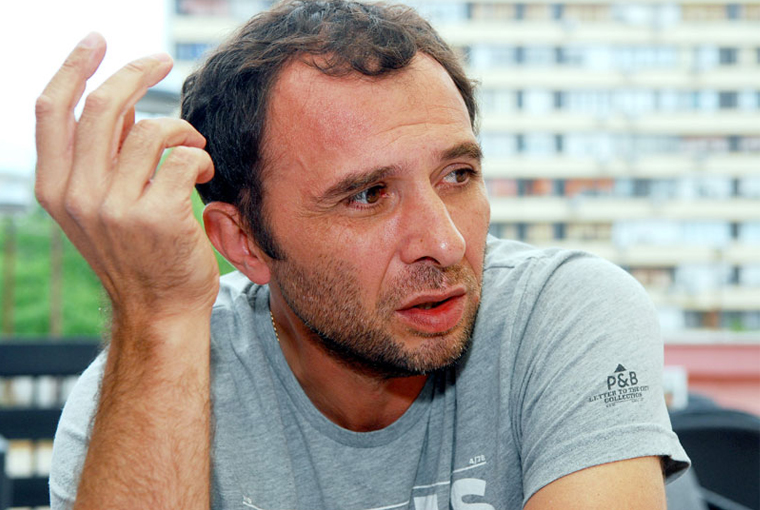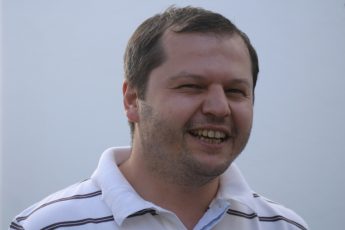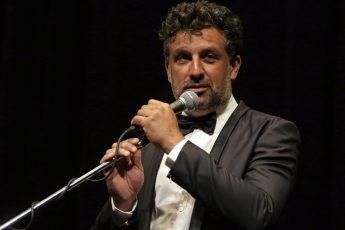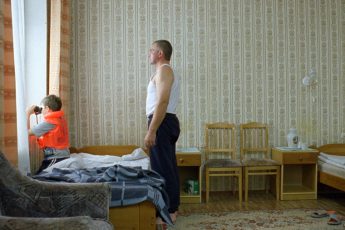
The Hunter” is Bakuradze’s second feature film. The film tells the story of a hunter whose life changes when workers from a local prison colony land on his farm. We met Bakuradze in Cannes, where the film screens as part of the “Un Certain Regard” section…
What made you create the character of the hunter ?
The first image I had was of the appearance of a man who observes the life surrounding him. I wanted him to observe, despite the materialistic problems he might have, or the health problem of his son. Next to the image of this man appeared the image of another character: that of a woman. The woman leads a completely different life but has similar problems. For me it was interesting to observe these two people, their path and the necessity of the way the two approach one another. It was very important to place these people into a milieu where they wouldn’t be influenced by the outside world. There should not be any exterior obstacles for the characters to become closer.
This was crucial because I wanted to show a man who creates the world in which he lives. He creates the world with his own perception. I am sure that as they approach, they do not act within a social framework, they are not influenced by the morals of society, like adultery or whatever. It’s an entirely different encounter. It’s an act of liberation. It’s as if they help each other.
What connection can be made between this relation and the man’s work as a hunter?
There had to be something outside of his daily life, like hunting, that could make the character more complex. The character needed a universe of his own. If there would only be the man and his problems, he would not have been able to think, and to make a decision coming from his own self.
How is this interior universe perceptible?
Well it happens through a very classical procedure, which is the transmission of my vision into that of the actor. Everybody has something inside of them with which they cannot make peace. This doesn’t have to be something very concrete. But the most important thing is to find it. If the person doesn’t have a problem, the actor has to accept the story, the problems and the emotions of the character. The actor has to be directed by this character in order to work.
During the shooting, this was very difficult. There are a lot of organizational things going on at the same time, so even for me it is sometimes hard to find the right emotions and convey them to the others. It’s already hard to find the right conditions within ourselves, but it is even harder to have them re-experienced by somebody else. If I don’t succeed, I try to make the actors play something entirely different, changing the context that can later be perceived on screen.
Was it hard for the actors as they are not “professionals”?
It is unbelievable how the main actors changed completely during the process of shooting. Not only did they change on screen, they also changed in real life. Mikhail Barskovitch, the actor playing the hunter, is very open in real life. He likes to tell funny stories, he’s very talkative. But during the shooting, he began to close himself little by little to find the character. Not because he wanted to torture himself, but because he really wanted to understand. It really has a hunter’s way of acting. He observes and observes and then suddenly he acts. He only acts when he has clearly made a decision.
Although your film looks very “objective”, almost like a documentary, some images in your film seem “subjective.” Did you also try to express the hunter’s emotions through the images?
It is very important to understand from what point of view one observes what is happening. I don’t know if I succeeded in showing this, but I wanted to show the main character in his microcosm from the beginning of the film without necessarily revealing that this is the main character, without showing who he is. It was very important for me to show this story without underlining certain moments more than others, without preferences. But there is a transition in the film, where this exterior point of view changes to become that of the main character.
…for example, we don’t see what happens to the animals Ivan hunts, but we see what happens to the animals he keeps in the slaughterhouse…
Right. That’s because the hunting world is his own universe. I stayed in the countryside every summer as a child and I saw a lot of hunters. Of course hunting has elementary reasons, but there is also something else, something apart from hunting. I would almost say hunting is like an interior quality, the man is a predator…
The world you portray is very archaic. Do the characters feel at home in the place they live?
Yes of course. They feel that they are closely related to the generation that preceded them and that will come after them. Time and space repeat themselves.
The daughter however wants to go to war. I sometimes got the feeling that they’d like to be somewhere else.
No. On the contrary. Maybe this is difficult for a Western audience to understand. I think everybody has the potential to become a hero.
…in one scene we see a memorial and Ivan’s daughter asks him what the Soviet Union was...
Yes, but it is of no importance who is buried under this monument, if it was a hero from the First or Second World War. During the precedent generations the heroes lived during war, where they became heroes. But today, in Pacifist times, I still find the thirst for heroic action, the power to do something heroic. It is not important that the child knows who died, if it was a soldier. It is only important to know that it was someone important, a hero.
Thank you for the interview.




Leave a Comment